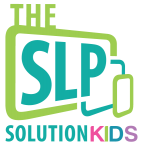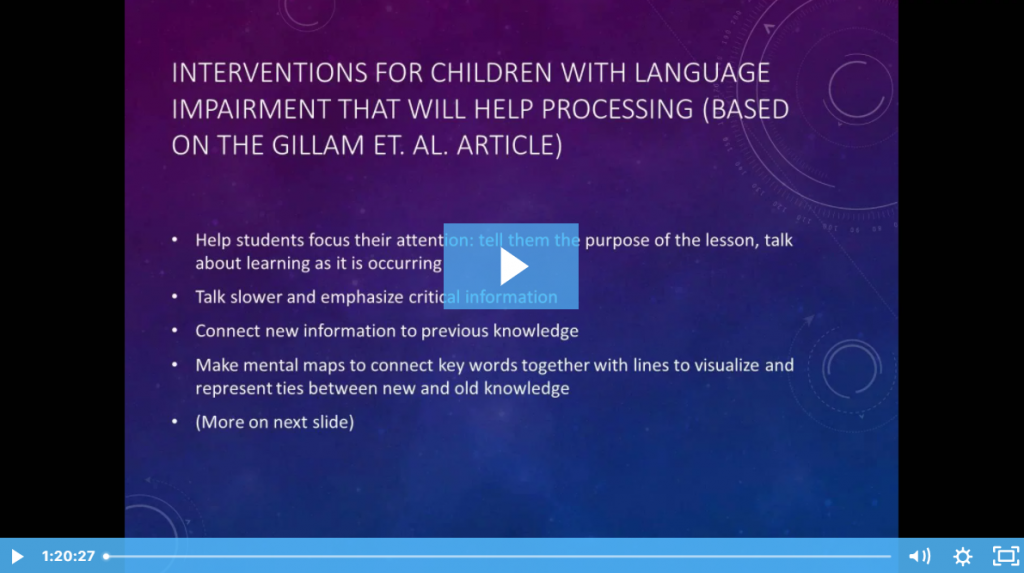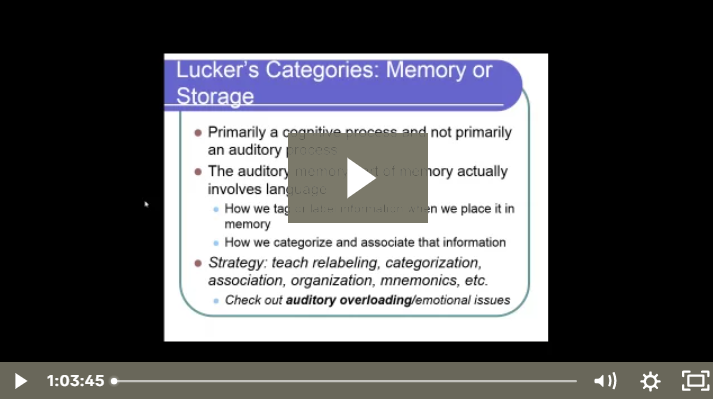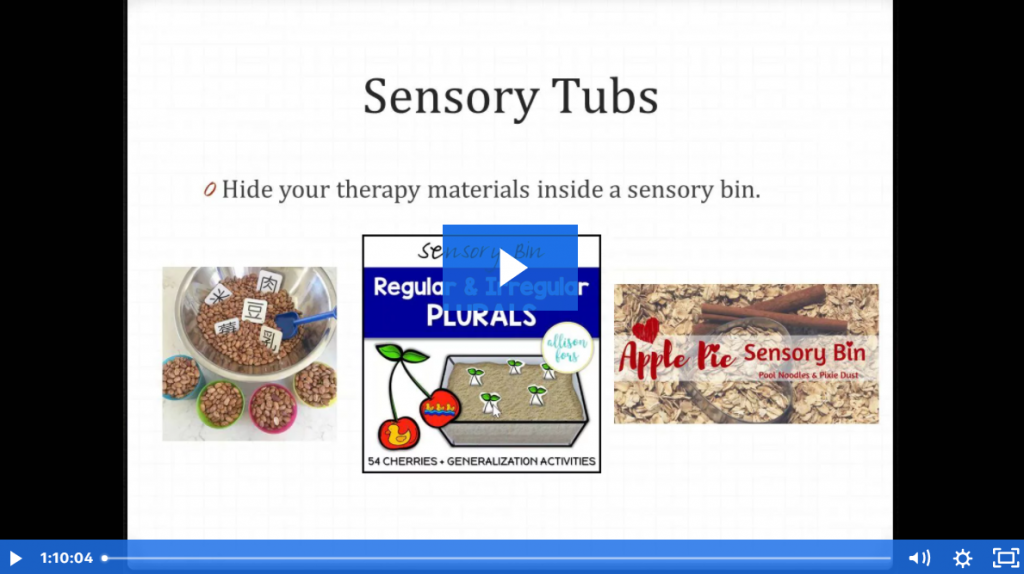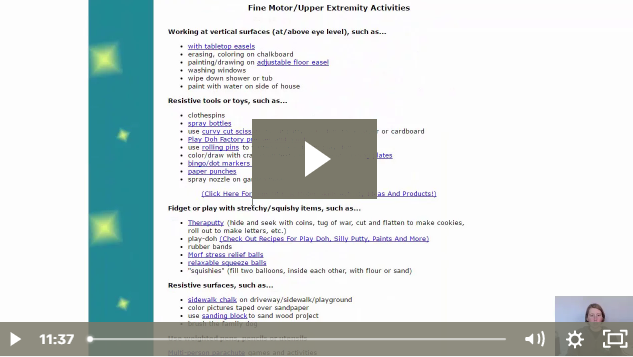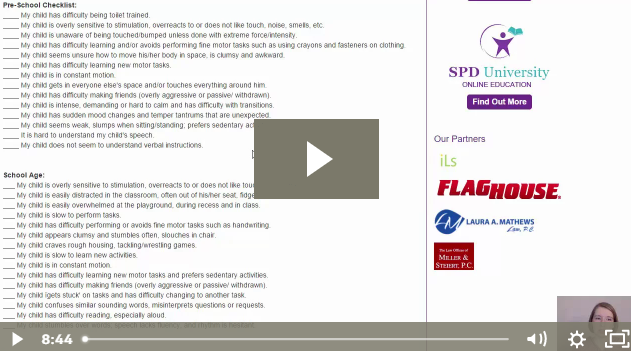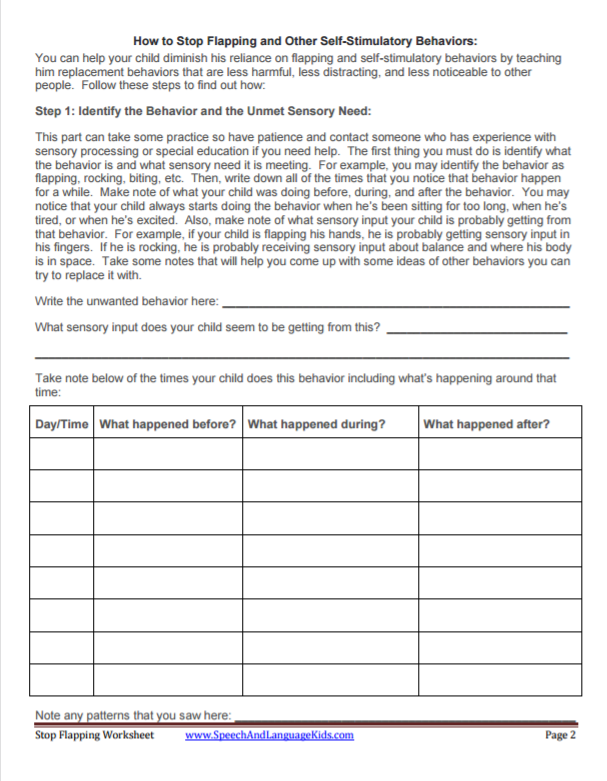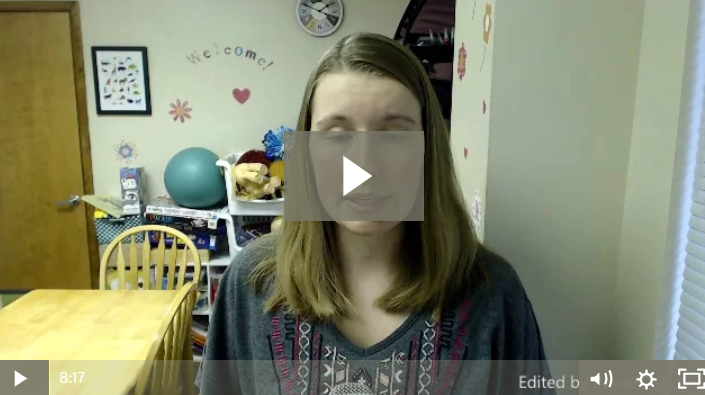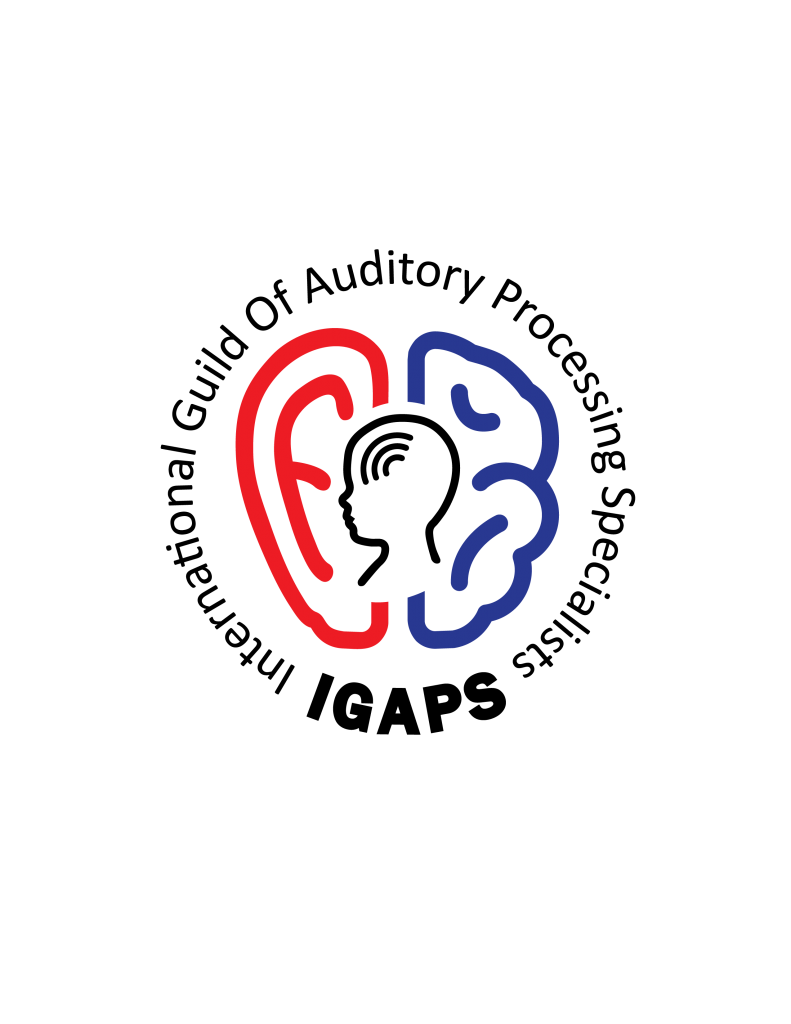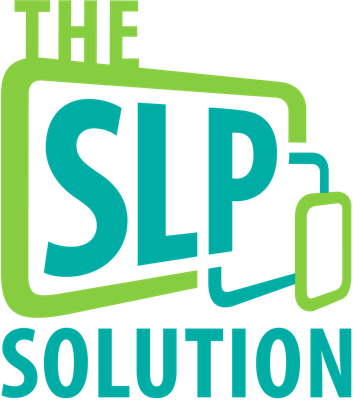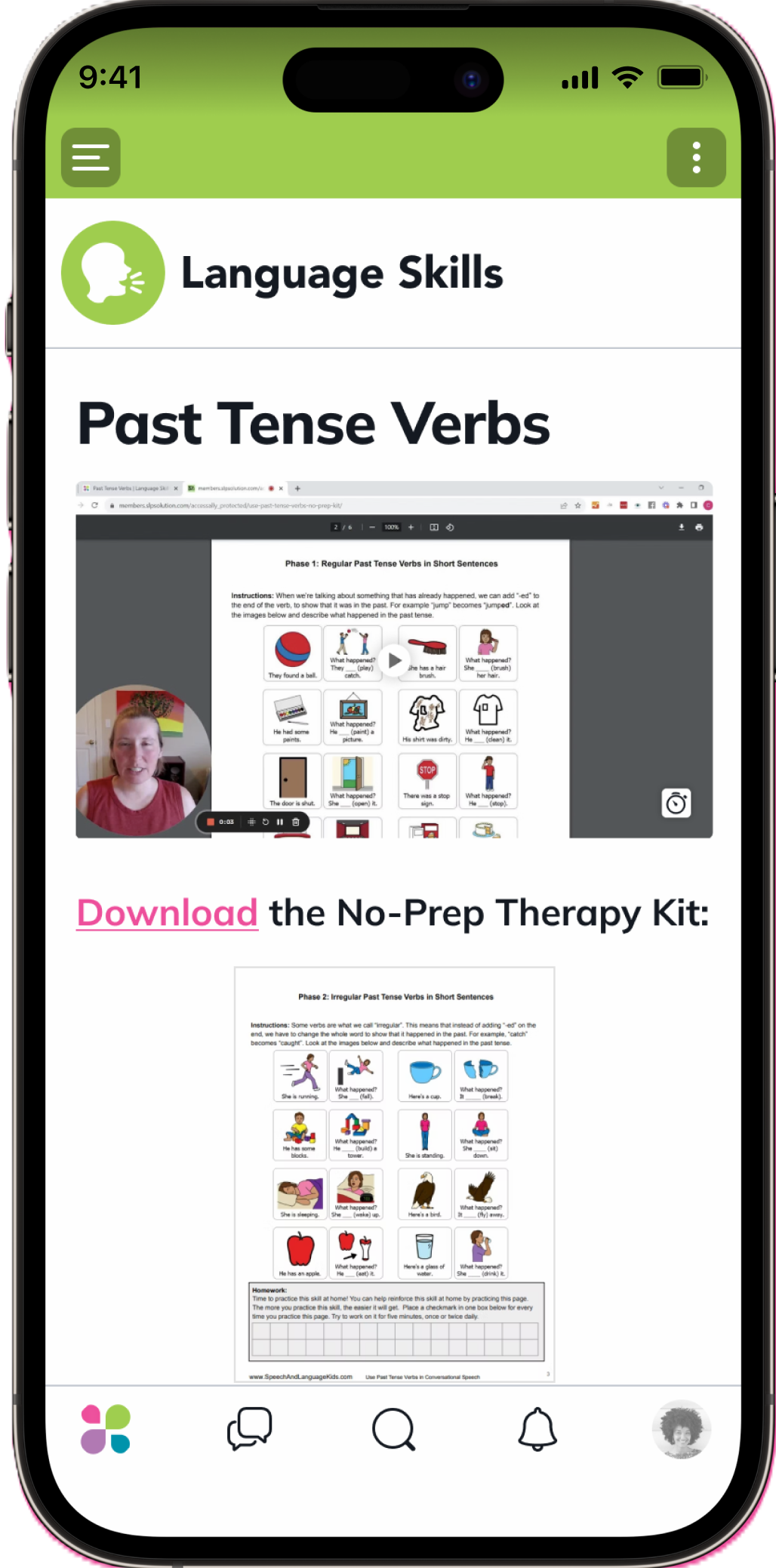Condition: Processing Problems
Jump To:
Norms by Age Evaluation Therapy Suggested Goals
Definition:
Processing problems occur when the brain and sensory systems have trouble receiving input (of some kind) and making sense of it or using it effectively.
- This is not a diagnosis in itself, it simply describes difficulties a child is having (though some types of processing has specific diagnoses, like auditory processing disorder.
- Processing doesn’t have anything to do with intelligence (though children with low cognition can ALSO have processing problems)
Source: https://www.understood.org/en/learning‐attention‐issues/child‐learning‐ disabilities/information‐processing‐issues/information‐processing‐issues‐what‐ you‐need‐to‐know
Types of Processing Problems:
- Sensory processing disorder
- Auditory processing disorder
- Language processing problems
What I found from reviewing the literature:
- Theoretical concept that a child is having trouble processing the language components of a signal/message that is not caused by impaired cognition or a lack of language learning/knowledge (though they can have both)
- Not well‐defined in the current literature. Is some debate whether this is a different thing than language impairment
- Hard to tease out from other processing problems as well
Developmental Norms:
Sensory Processing Norms:
Check out this great Sensory Processing Development Chart from Kidsense for specific ages of developmental markers in sensory processing (up through 7 years)
Auditory Processing:
Check out these developmental milestones in auditory processing from the ADDitude website:
Developmental Milestones Missed: Red Flags for APD
Language Processing Norms:
Language processing norms will look a lot like our regular language development norms. Check out our developmental checklists for language here:
(Worksheet) Developmental Checklists for Language (6 mos – 8 yrs)
Evaluation:
Sensory Processing Disorder:
Diagnosis of sensory processing disorder is typically conducted by an occupational therapist with specialized training.
Diagnosis of Sensory Processing Disorder usually begins with screening, which is basically a professional search for red flags that indicate enough differences in development to warrant a more comprehensive assessment. Screening may take place at school, in your doctor’s office, or at a private practice clinic. Wherever it occurs, you are likely to be asked to fill out one or more parent checklists and a developmental history to supplement the observations of the evaluators.
If differences exist that are sufficient to warrant further assessment, evaluation will follow. An evaluation for SPD involves standardized testing, detailed clinical observations, and parent-report measures. If a multi-disciplinary team is involved, the evaluative process may also include a general health and physical evaluation, speech/language evaluation, psychological evaluation, and possibly referral to medical or other specialists if a specific problem area is identified.
Currently, the primary standardized assessment tool used for diagnosing Sensory Processing Disorder is the Sensory Integration and Praxis Tests (SIPT) developed by A. Jean Ayres, PhD, OTR. The SIPT is suitable for children ages 4 to 8 who have learning or developmental delays, particularly in praxis (motor planning) or tactile or visual discrimination.
Source: https://www.spdfoundation.net/diagnosing.html
Auditory Processing Disorder:
A multidisciplinary team approach is critical to fully assess and understand the cluster of problems exhibited by children with APD. Thus, a teacher or educational diagnostician may shed light on academic difficulties; a psychologist may evaluate cognitive functioning in a variety of different areas; a speech-language pathologist may investigate written and oral language, speech, and related capabilities; and so forth. Some of these professionals may actually use test tools that incorporate the terms “auditory processing” or “auditory perception” in their evaluation, and may even suggest that a child exhibits an “auditory processing disorder.” Yet it is important to know that, however valuable the information from the multidisciplinary team is in understanding the child’s overall areas of strength and weakness, none of the test tools used by these professionals are diagnostic tools for APD, and the actual diagnosis of APD must be made by an audiologist.
To diagnose APD, the audiologist will administer a series of tests in a sound-treated room. These tests require listeners to attend to a variety of signals and to respond to them via repetition, pushing a button, or in some other way. Other tests that measure the auditory system’s physiologic responses to sound may also be administered. Most of the tests of APD require that a child be at least 7 or 8 years of age because the variability in brain function is so marked in younger children that test interpretation may not be possible.
Source: https://www.asha.org/public/hearing/understanding-auditory-processing-disorders-in-children/
Language Processing Disorder:
Suggested Goals:
Goals for processing problems should be related to the specific deficits found in the testing.
For children with auditory processing disorder, goals should be related to communicative and academic success in relation to auditory input.
For children with sensory processing disorder…sensory issues should be addressed by the occupational therapist but communication goals can be used to support the client’s sensory needs, such as communicating to ask for sensory breaks and regulating emotions.
For children with language processing problems…goals should address specific language deficits uncovered during the language assessment.
Therapy:
Here are some more resources and information that may help you when it comes to treating this condition.
Processing Problems – Webinar Recording
Full, hour-long presentation about how to work with various types of processing problems, including sensory, visual, auditory, and language. Includes therapy techniques suggested for children with language processing problems.
Auditory Processing Disorders – Webinar Recording
Full, hour-long presentation from Dr. Jay Lucker about working with children with auditory processing disorders.
How to Use Sensory and Movement Activities to Improve Participation in Therapy
While these strategies are helpful for all children, they are especially effective for children with sensory processing disorders who may need some extra sensory input to maintain focus during sessions.
How to Work with a Sensory-Seeking Child who Can’t Focus
This quick video will give you some simple strategies you can use when working with a sensory seeker.
The SLP’s Guide to Sensory Processing Disorders (SPD)
An overview of sensory processing disorders including the symptoms and red flags as well as information about where to refer if you suspect SPD.
Self-stimulatory behaviors (also called stimming) can sometimes become harmful to the child or to others. In this case, we can help the child identify alternative ways to get those sensory needs met using functional communication and environmental supports. Includes a workbook with help for this.
Language Formulation Dysfluency
This other term is also not very well researched but can mimic language processing problems in children. Check out the information on this topic here.
International Guild of Auditory Processing Specialists
Need more resources for working with children with auditory processing disorders? Check out our recommended website.
Didn’t Find What You’re Looking For?
We’re constantly working on adding new features and topics to this membership site. If you don’t find what you’re looking for by using the search bar at the top of the page, please use the button below to request new features or topics to be added!
